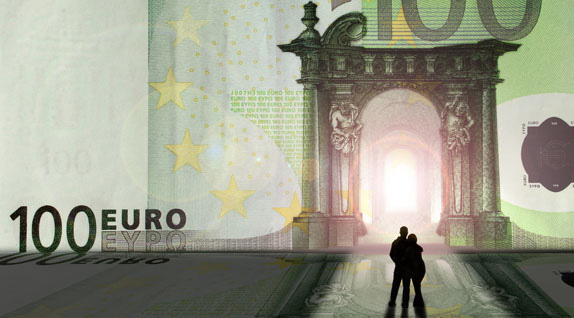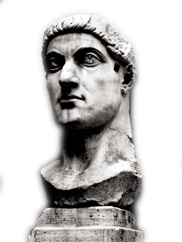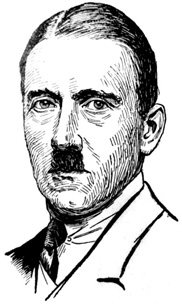 Photo illustration: Paula C. Rondeau
Photo illustration: Paula C. Rondeau
Article
Financial analysts, government officials and journalists have no idea where Europe is headed. The voting populace has no idea where to turn. Yet history offers proof of what is to come.
Learn the why behind the headlines.
Subscribe to the Real Truth for FREE news and analysis.
Subscribe NowIn the wake of the crippling Greek financial crisis that turned into a $1 trillion bailout, European officials seem to have found only one answer: severe and substantial budget cuts.
News of this solution grates on the ears of European citizens, with nearly two generations having grown up on sweeping government programs, universal healthcare and low retirement ages, along with much-beloved pension plans.
As the crisis deepens, there is little time to wean the public from the government handouts they have come to expect—and even demand. But officials across Europe increasingly have no choice, despite the public ire each budget cut draws.
Germany: Officials unveiled plans for $104.4 billion in budget cuts and new taxes over the next four years. Only days later, tens of thousands protested against the biggest cutbacks since World War II.
Greece: Greek officials presented their third round of austerity measures, including retirement reform, pension reform (with a 30 percent cut to public sector bonuses), new taxes on fuel, electricity, alcohol and gambling, and a freeze on public spending. The declaration renewed continuous general strikes and protests by civil and government service employees. The strikes, many of which are violent, have disrupted or completely halted air and ground transportation and other government services.
France: Officials raised the retirement age and reformed pensions, instilling a three-year public spending freeze. In response, labor unions organized widespread strikes that delayed flights, closed schools and disrupted commuters.
Portugal: The government announced public spending and pension reforms, cuts in unemployment benefits and increased taxes. Portuguese workers responded with a trade union strike.
Spain: Officials reduced state investments, imposed labor market and pension reforms, increased taxes on corporate profits exceeding $2.6 million (including bankers’ bonuses) and plan to raise the retirement age from 65 to 67. In response, the opposition party called for Prime Minister Jose Luis Rodriguez Zapatero—whose popularity has plummeted to 26 percent—to step down, dissolve Parliament and call an early general election ahead of the one scheduled for 2012. Approximately 300,000 unionized workers are prepared for a countrywide general strike in late September, which would shut down cities.
European politicians are in a bind. They must keep their governments solvent or their nations will flounder. But they also must satisfy the public’s desire to keep expensive government programs or lose their jobs come the next election. Violent civil unrest looms.
This seems an impossible feat! Yet Europe has weathered times such as these before, and its history reveals a repeated pattern during such periods. Following this historical track record, Europeans will soon look to anyone able to deliver what they want.
What the People Desire
It seems the populace wants the best of all worlds. Someone who can do it all—keep the eurozone together, protect their shorter work weeks, ensure early retirement ages and provide the high standard of living those in the European Union have come to expect. Someone who can secure their social programs and pensions. They want someone who can step in and take charge.

To accomplish this, one leader would have to quickly seize sweeping amounts of centralized power. He would have to control the social, political and military powers of Europe. He would have to unite the continent in a way not seen since the EU’s inception.
Does this sound unbelievable? It should not. This is what Europe has always done. Throughout the centuries, the continent has surrendered its power to one man—one who can ensure they continue to live comfortably.
One of the first times Europe relied on a dynamic figure to protect their lifestyles was during the Roman Empire. Constantine united the people under one religion and ruled as an unchallenged emperor. By AD 321, Constantine established Sunday as part of the official state religion, thus legitimizing the various traditions attached to that day.
Under his watch, the empire enjoyed continual wealth and abundance. Edward Gibbon’s The History of the Decline and Fall of the Roman Empire describes the empire at that time, when the capital of Constantinople “enjoyed, within their spacious enclosure, every production which could supply the wants or gratify the luxury of its numerous inhabitants. The sea-coasts of Thrace and Bithynia…still exhibit a rich prospect of vineyards, of gardens, and of plentiful harvests; and the Propontis has ever been renowned for an inexhaustible store of the most exquisite fish, that are taken in their stated seasons, without skill, and almost without labor.”
In short, with Constantine, the people had anything they wanted to gratify their desires.
But since then this has happened time and again. Europe emerged from a “transition” period under the Germanic tribes of the Vandals, Heruli and Ostrogoths as a disunited kingdom.
In AD 554, Justinian routed the Ostrogoths and reconstituted the empire as the Holy Roman Empire—nearly restoring the size and grandeur of its land holdings to that of the original empire.
The examples do not end there. While some historians paint the life of the common person as harsh under Holy Roman Emperor Charlemagne, others record that he used his expansive power for “increased royal concern for the helpless, continued efforts to strengthen royal administration, active diplomacy, the maintenance of religious reform, and support of cultural renewal” (Encyclopaedia Britannica). In the end, because his thinking on a politically unified continent has influenced European ambitions for centuries, Charlemagne has come to be known as the “Father of Europe.”
Otto the Great came next, crowned emperor in AD 962. His cultural reforms and use of the Roman Church to achieve peace made a secure empire.

He was followed by the Hapsburg dynasty of Charles V in AD 1520, and Napoleon’s reign, which began with his crowning in 1805. Both times, Europe again had emperors.
The most recent resurgence of the Holy Roman Empire began when Giuseppe Garibaldi united Italy in 1870, which culminated in the defeat of Adolf Hitler and Benito Mussolini in 1945.
In every case, one man took the reins of the continent, often backed by the Roman Catholic Church. For varying reasons, that one man took power and unified Europe—sometimes to horrific ends, as with Hitler and Mussolini.
Yet the pattern is undeniable. Time and again, Europe united under one man. Often, the man was a dictator, such as Napoleon, but the continent always turned to these men, who secured freedoms and brought stability to European life.
History Written in Advance
The word “empire” brings unease to many in the EU—with images of Hitler’s Third Reich still ingrained in the public mind. And most in Europe have little interest in sweeping socio-political-religious unity. They are, after all, a group of many different peoples, with different languages and traditions. They have also become accustomed to great freedoms.
Be careful, however, of dismissing this “emperor” scenario as an impossibility today. History repeats itself, especially if those involved believe such things can never happen again.
Most Europeans are not prepared—and do not want—to live with less. As we have already seen, they will do whatever it takes to maintain their standard of living. One only has to look to the riots in response to proposed budget cuts that threaten the programs they have come to view as “rights.”
They want what Constantine gave to Europe—a government that can “supply the wants or gratify the luxury of its numerous inhabitants” with “rich prospect of vineyards, of gardens, and of plentiful harvests.” They want lives of comfort and normalcy.
The annals of history show where Europe is headed. Yet the Holy Roman Empire came much later than other great, unifying powers. Conditions in these ancient kingdoms mirror the lifestyles desired in Europe today.
Perhaps the first notable example is Babylon under King Nebuchadnezzar II, known for his military might and the splendor of his capital, Babylon—which was home to the fabled hanging gardens, one of the seven wonders of the ancient world.
This is the same King Nebuchadnezzar of the biblical book of Daniel. In the account, the king dreamed of a statue: “This image’s head was of fine gold, his breast and his arms of silver, his belly and his thighs of brass, his legs of iron, his feet part of iron and part of clay” (Dan. 2:32-33).
This ambiguous dream made the king furious, and he was prepared to kill every wise man in the kingdom until he had an answer (Dan. 2:12). Yet this vision, and its interpretation by Daniel, is more important than you might know! It offers absolute proof of where to look to understand Europe’s future.
Place your Bible next to the record of history. Nebuchadnezzar’s dream accurately foretold a number of successive empires. Read Daniel 2:37: “You, O king [Nebuchadnezzar], are a king of kings: for the God of heaven has given you a kingdom, power, and strength, and glory.” Verse 38 adds, “You are this head of gold.”
The Bible has just interpreted itself. Nebuchadnezzar and Babylon represent the first kingdom.
Verses 39-40 go on to describe three successive kingdoms that would follow Babylon. Here is how they are described: “And after you [Nebuchadnezzar] shall arise another kingdom [of silver] inferior to you, and another third kingdom of brass, which shall bear rule over all the earth. And the fourth kingdom shall be strong as iron.”
Each part represents, and foretold of, a major empire. Again, the first, which was the head of gold, was Nebuchadnezzar’s own Babylonian or Chaldean Empire (625-539 BC). The silver chest and arms represent the second kingdom, the Medo-Persian Empire (558-330 BC). The belly and thighs of brass represent the third, the Grecian or Greco-Macedonian Empire (333-31 BC), ruled by Alexander the Great.
Finally, the fourth kingdom, depicted by the lower legs of iron, with feet and toes of iron mixed with clay, is the Roman Empire, with its succession of historic resurrections. These were the empires detailed above—from Justinian all the way to Mussolini.
Realize what you just read! Each of these empires were foretold centuries in advance of their arrival on the world scene. This makes the account in Daniel history written in advance, or Bible prophecy. These verses are one of the many proofs that validate the truth and accuracy of God’s Word. (To learn more, read Bible Authority...Can It Be Proven?)
The validity of the Bible is essential to understanding the exact future of Europe today.
Lives of Luxury
While each of the successive resurrections of the Holy Roman Empire hearkens back to the original empire, the Holy Roman Empire is also likened to Babylon in the Bible. This clue reveals what is to come for Europe.
Revelation 18:16 describes a “great city”—revealed to be Babylon in verse 2—“that was clothed in fine linen, and purple, and scarlet, and decked with gold, and precious stones, and pearls!”
When Europe unites under one political authority once again, the result will be economic security and lives of comfort and abundance.
Note how Europe is described in the rest of chapter 18:
- Verse 3: “the merchants of the earth are waxed rich through the abundance of her delicacies”—the entire world will benefit from this economic powerhouse.
- Verses 12-13: “The merchandise of gold, and silver, and precious stones, and of pearls, and fine linen, and purple, and silk, and scarlet, and all thyine wood, and all manner vessels of ivory, and all manner vessels of most precious wood, and of brass, and iron, and marble, and cinnamon, and odors, and ointments, and frankincense, and wine, and oil, and fine flour, and wheat, and beasts, and sheep, and horses, and chariots…”
- Verse 19: “that great city, wherein were made rich all that had ships in the sea by reason of her costliness!”
These verses could easily describe the times of Nebuchadnezzar and Constantine—but this is Europe’s future! Under the coming ruler, Europeans will live “deliciously” (vs. 7), which is better translated “luxuriously.”
Details in Revelation 18 reveal why Europe will give power to one man: he will bring material riches. The coming resurrection of the Roman Empire will bring peace, stability—luxury! The masses will be on board with this new socio-political-military system. In fact, conditions in Europe will be better than at any point in its history.
Yet there is a problem.
This way of life comes with a cost. Think back to Constantine, when he abolished the Sabbath in favor of Sunday. Europe has followed suit ever since.
Living deliciously could be summed up another way—living covetously. Just look at the fruits of the lives of many in modern Europe: teenagers riot because they do not want to work past age 55—loose sex leads to unwanted pregnancies, and often abortions—sexual perversions—and out of control drug use.
God sums this up in Revelation 18:5: “For her sins have reached unto heaven, and God has remembered her iniquities.” As a result, “Therefore shall her plagues come in one day, death, and mourning, and famine; and she shall be utterly burned with fire: for strong is the Lord God who judges her” (Rev. 18:8).
Despite the best efforts, Europe—and any man chosen to rule over it—will fail to bring the lasting peace and abundant living so many desire. When Europe crumbles, everyone will bemoan its destruction. Why? Not because the system has crumbled, but because they are no longer able to pursue unbridled lives of luxury.
“[The people] cried when they saw the smoke of her burning, saying, What city is like unto this great city! And they cast dust on their heads, and cried, weeping and wailing, saying, Alas, alas, that great city, wherein were made rich all that had ships in the sea by reason of her costliness! For in one hour is she made desolate” (Rev. 18:18-19).
“And the voice of harpers, and musicians, and of pipers, and trumpeters [referencing the fine arts of Europe] shall be heard no more at all in you; and no craftsman, of whatsoever craft he be, shall be found anymore in you; and the sound of a millstone will be heard no more at all in you; and the light of a candle shall shine no more at all in you; and the voice of the bridegroom and of the bride will be heard no more at all in you: for your merchants were the great men of the earth” (vs. 22-23).
However, God is merciful and the punishment will not continue without end: “And a mighty angel took up a stone like a great millstone, and cast it into the sea, saying, Thus with violence will that great city Babylon be thrown down, and will be found no more at all” (vs. 21).
This signals the end of the Roman/Babylonish system.
True Abundance
Who, then, can Europeans rely on to bring true and lasting safety and abundance?
Return once again to the statue of Daniel 2. After Daniel describes the image of gold, silver, brass and iron, with feet of iron mixed with clay, he mentions “a stone was cut out without hands.”
This stone came down and “smote the image upon his feet that were of iron and clay, and broke them to pieces” (Dan. 2:34).
Here is the ultimate end of these systems—and the lifestyles they brought: “Then was the iron, the clay, the brass, the silver, and the gold, broken to pieces together, and became like the chaff of the summer threshing floors; and the wind carried them away, that no place was found for them: and the stone that smote the image became a great mountain, and filled the whole earth” (vs. 35).
The demise of these systems will usher in another, very different kingdom—the kingdom of God!
Led by Jesus Christ—who is the “stone cut out of the mountain without hands”—this kingdom will bring true and everlasting peace and prosperity to the entire world. Notice what Christ said during His earthly ministry—and what He will one day tell the whole world: “I am come that they might have life, and that they might have it more abundantly” (John 10:10).
God wants everyone to live rich, full, abundant lives. He wants all peoples to enjoy His blessings. Savor this next wonderful verse: “And in this mountain [God’s government] shall the Lord of hosts make unto all people a feast of fat things, a feast of wines on the lees, of fat things full of marrow, of wines on the lees well refined” (Isa. 25:6).
But God also wants mankind to enjoy the results of living under His Law: abundance, peace and prosperity.
The coming kingdom will bring a new world economic system based on sound financial policies. There will be no more profiteering from risky investments. No longer will financial institutions, insurance companies and loan agencies exist as we know them, nor will banks take advantage of customers.
Individuals will learn not to overspend. People will be guided to follow sound financial practices and to not buy more than they can afford. There will be no flashy advertisements inducing lust to “buy now,” in order to achieve instant gratification, encouraged by all of today’s media. Rather, the established way will emphasize a strong work ethic, obedience to God’s laws, and the way of give and outgoing concern toward others.
Before the Good News
As the world learns not to covet, people will also learn that the goal of being rich is destructive (I Tim. 6:9-10). They will learn that giving to others always returns even greater blessings to the giver (Luke 6:38). Lust-driven consumerism will also disappear, along with overwhelming consumer debt and resulting bankruptcy. Without lust, materialism and impulse buying will vanish.
Under the government of God, man will experience prosperity and happiness. Yet, this will not happen immediately. Before Europe can experience this true abundance, it must realize once and for all that its own solutions and governmental systems do not work! After a time of fleeting prosperity, the continent will plunge into the time of great difficulty described in Revelation 18.
Yet whenever God warns of impending punishment, He also offers a way to escape. But this escape means you must take action! Notice what God commands in Revelation 18 verse 4: “Come out of her, My people, that you be not partakers of her sins, and that you receive not of her plagues.”
God says that, to escape, one must come out. But in order to leave something, you must first know what it is. To learn more about this—and how Europe’s coming unification will personally affect you—read David C. Pack’s booklet Who or What Is the Beast of Revelation?
More on Related Topics:
- Life Is Harsh and Dangerous in Russian-run Parts of Ukraine, Activists and Former Residents Say
- Spain Is Granting Legal Status to Potentially 500,000 Immigrants
- Bulgaria’s Government Resigns After Mass Protests
- 10 Years After the Bataclan Massacre, Paris Is Still Scarred by That Night of Terror
- French Government Collapses in 14 Hours, Deepening Political Crisis



